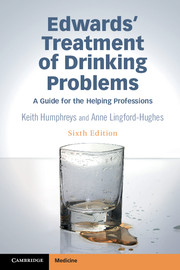Book contents
- Edwards’ Treatment of Drinking ProblemsA Guide for the Helping Professions
- Edwards’ Treatment of Drinking Problems
- Copyright page
- Dedication
- Contents
- Book part
- A note on the sixth edition
- Introduction
- Part I Background to understanding
- Part II Treatment: Context and content
- Chapter 8 Introduction, settings, and roles
- Chapter 9 Case-finding and intervention outside of specialty settings
- Chapter 10 Assessment of patients with drinking problems
- Chapter 11 Withdrawal states and their clinical management
- Chapter 12 The therapeutic relationship
- Chapter 13 Specialist treatment of drinking problems
- Chapter 14 Alcoholics Anonymous and other mutual-help organizations
- Chapter 15 Religion, spirituality, and values in treatment
- Chapter 16 Pursuing treatment outcomes other than abstinence
- Chapter 17 Managing setbacks and challenges in treatment
- Epilogue
- Index
- References
Chapter 12 - The therapeutic relationship
from Part II - Treatment: Context and content
Published online by Cambridge University Press: 05 April 2016
- Edwards’ Treatment of Drinking ProblemsA Guide for the Helping Professions
- Edwards’ Treatment of Drinking Problems
- Copyright page
- Dedication
- Contents
- Book part
- A note on the sixth edition
- Introduction
- Part I Background to understanding
- Part II Treatment: Context and content
- Chapter 8 Introduction, settings, and roles
- Chapter 9 Case-finding and intervention outside of specialty settings
- Chapter 10 Assessment of patients with drinking problems
- Chapter 11 Withdrawal states and their clinical management
- Chapter 12 The therapeutic relationship
- Chapter 13 Specialist treatment of drinking problems
- Chapter 14 Alcoholics Anonymous and other mutual-help organizations
- Chapter 15 Religion, spirituality, and values in treatment
- Chapter 16 Pursuing treatment outcomes other than abstinence
- Chapter 17 Managing setbacks and challenges in treatment
- Epilogue
- Index
- References
- Type
- Chapter
- Information
- Edwards' Treatment of Drinking ProblemsA Guide for the Helping Professions, pp. 184 - 189Publisher: Cambridge University PressPrint publication year: 2016



